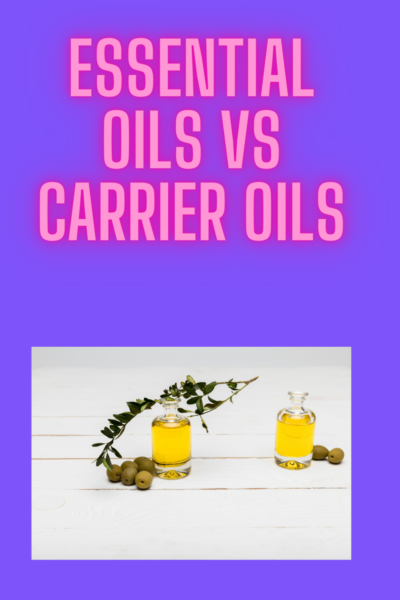Introduction
Essential oils vs. carrier oils- How are they different from each other and how do they compare? In the world of natural remedies and aromatherapy, both essential oils and carrier oils play integral roles. These oils are derived from plants and offer a myriad of benefits, but they serve distinct purposes and should not be confused with each other. In this blog post, I’ll explain the differences between essential oils vs. carrier oils, their individual benefits, and how they can be used effectively both separately and together.
Essential Oils: Potent Aromatics with Therapeutic Properties
Essential oils are highly concentrated extracts obtained from various parts of plants, including leaves, flowers, stems, and roots. These oils are renowned for their aromatic properties and potent therapeutic effects. They contain the concentrated essence of the plant, often capturing its unique scent and therapeutic compounds. Due to their concentration, essential oils are typically used in small quantities and should be diluted before direct application to the skin. This is especially true with hots oils such as clove, oregano, thyme and cinnamon.
Key Characteristics of Essential Oils:
- Aroma: Essential oils are well-known for their distinct and captivating aromas. These aromas can have powerful effects on mood, emotions, and even physical well-being through a process known as aromatherapy.
- Therapeutic Benefits: Different essential oils offer a wide range of therapeutic benefits, such as relaxation, stress relief, improved focus, pain management, and more. For instance, lavender essential oil is commonly used for relaxation and sleep, while peppermint essential oil is known for its energizing properties and it’s ability to help with digestive challenges.
- Potency: Essential oils are potent due to their concentration. Only a few drops are usually needed for desired effects. However, using them undiluted on the skin can cause irritation or sensitization.
Carrier Oils: Nourishing and Protective Base Oils
Carrier oils, also known as base oils or vegetable oils, are derived from the fatty portions of plants, such as nuts, seeds, and kernels. Unlike essential oils, carrier oils are not as concentrated and do not have strong aromas. These oils are used to dilute essential oils, making them safe for direct skin application and reducing the risk of irritation. Carrier oils also offer their own set of benefits, as they contain fatty acids, vitamins, and minerals that nourish and protect the skin.
Key Characteristics of Carrier Oils:
- Neutral Scent: Carrier oils have mild, neutral scents that do not overpower the aroma of essential oils. This makes them an excellent medium for blending and dilution.
- Dilution and Application: Carrier oils are used to dilute essential oils before applying them to the skin. This dilution helps to reduce the risk of skin sensitization and irritation, ensuring safe application.
- Skin Benefits: Carrier oils provide hydration and nourishment to the skin. Different carrier oils have distinct properties, such as moisturizing, soothing, and anti-inflammatory effects. Examples of carrier oils include jojoba oil, coconut oil, and sweet almond oil.
Choosing the Right Combination
Using essential oils and carrier oils in combination can yield remarkable results. When selecting a carrier oil, consider your skin type and the desired therapeutic effect. For instance, jojoba oil is well-suited for most skin types and is often used as a carrier oil due to its resemblance to the skin’s natural sebum. I personally really like a fractionated coconut oil. This is a version of a coconut oil that is already liquid. You can also consider almond oil, or sesame oil among other carrier oils.
Before using any essential oil or carrier oil, it’s crucial to do your research, as some individuals may have allergies or sensitivities to certain oils. Conduct a patch test and follow recommended dilution ratios to ensure safety and efficacy. I personally recommend starting with about 1 tablespoon of carrier oil and no more than 2 drops of the essential oil for most essential oils.
Conclusion
Both essential oils and carrier oils have their unique qualities and benefits. Essential oils offer concentrated aromas and therapeutic effects, while carrier oils provide a nourishing base and dilution medium for safe skin application. By understanding the differences between these oils and how they can complement each other, you can harness their potential to enhance your well-being through aromatherapy and natural skincare. Essential oils vs carrier oils is important to understanding in order to use essential oils properly and for all aspects of your wellbeing.
Request a free foundations of wellness supplements kit.
Autoimmune Healing Blueprint Kit with Ebooks and Video
Did you find this helpful? Donate to help me be able to continue writing more content.
My Favorite Products (Affiliate links- if you make a purchase I may earn a small commission)
Thrive Market - healthy gluten free, sugar free and speciality online food and household products
Silk and Sonder Monthly Journals and Planners
My Portable Infrared Sauna
Self Care Journal
Olipop - healthy soda with probiotics and prebiotics
Digestion Kit
Stress Oils










